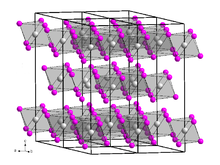Lutetium(III) iodide

| |
| Names | |
|---|---|
| Other names
Lutetium iodide
Lutetium triiodide | |
| Identifiers | |
| ChemSpider | |
| ECHA InfoCard | 100.034.054 |
| EC Number |
|
PubChem CID
|
|
CompTox Dashboard (EPA)
|
|
| Properties | |
| LuI3 | |
| Appearance | solid[1] |
| Density | 5.60 g/cm−3[1][2][3][4] |
| Melting point | 1050 °C[1] |
| Boiling point | 1210 °C[5] |
| Hazards | |
| GHS labelling: | |

| |
| Warning[1] | |
| H315, H319, H335 | |
| P261, P280, P304+P340, P305+P351+P338, P405, P501 | |
Except where otherwise noted, data are given for materials in their standard state (at 25 °C [77 °F], 100 kPa).
| |
Lutetium(III) iodide or lutetium iodide is an inorganic compound consisting of iodine and lutetium, with the chemical formula of LuI3.
Preparation
[edit]Lutetium(III) iodide can be obtained by reacting lutetium with iodine:[5][2]
- 2 Lu + 3 I2 → LuI3
Lutetium(III) iodide can also obtained by the reacting metallic lutetium with mercury iodide in vacuum at 500 °C:[5]
- 2 Lu + 3 HgI2 → 2 LuI3 + 3 Hg
The elemental mercury generated in the reaction can be removed by distillation.[6]
The lutetium(III) iodide hydrate crystallized from the solution can be heated with ammonium iodide to obtain the anhydrate.[7][5]
Properties
[edit]It is a brown, very hygroscopic solid with a bismuth(III) iodide-type crystal structure. In air, it quickly absorbs moisture and forms hydrates.[2][3][4] The corresponding oxide iodide is also readily formed at elevated temperature.[5]
Lutetium(III) iodide doped with cerium is designed for use in PET scanners.[8] Lutetium iodide can be used together with yttrium iodide and gadolinium iodide in LuI3-YI3-GdI3 scintillators to detect neutron and gamma radiation.[9]
References
[edit]- ^ a b c d e Lutetium(III) iodide, ultra dry, 99.9% (REO) at AlfaAesar, accessed on {{{Datum}}} (PDF) (JavaScript required).[dead link]
- ^ a b c Webelements: Lutetium: lutetium triiodide Retrieved 31.3.2018
- ^ a b Americanelements.com: Lutetium Iodide Retrieved 31.3.2018
- ^ a b Perry, Dale L. (2016). Handbook of Inorganic Compounds. 2. painos. CRC Press. p. 245. ISBN 9781439814628. Retrieved 2018-03-31.
- ^ a b c d e Georg Brauer (Hrsg.), unter Mitarbeit von Marianne Baudler u. a.: Handbuch der Präparativen Anorganischen Chemie. 3., umgearbeitete Auflage. Band I, Ferdinand Enke, Stuttgart 1975, ISBN 3-432-02328-6, S. 1077.
- ^ Asprey, L. B.; Keenan, T. K.; Kruse, F. H. Preparation and crystal data for lanthanide and actinide triiodides. Inorg. Chem., 1964. 3 (8): 1137-1240
- ^ 无机化学丛书 第七卷 钪 稀土元素. 科学出版社. pp 211
- ^ Saha, Gopal B. (2010). Basics of PET Imaging: Physics, Chemistry, and Regulations. Springer. p. 23. ISBN 9781441908056. Retrieved 2018-03-31.
- ^ Glodo, Jarek; van Loef, Edgar V. D. & Higgins, William M. (2008-06-17). "Mixed Lutetium Iodide Compounds". IEEE Transactions on Nuclear Science. 55 (3): 1496–1500. Bibcode:2008ITNS...55.1496G. doi:10.1109/TNS.2008.922215. ISSN 1558-1578. S2CID 36257295.
{{cite journal}}: CS1 maint: multiple names: authors list (link)
